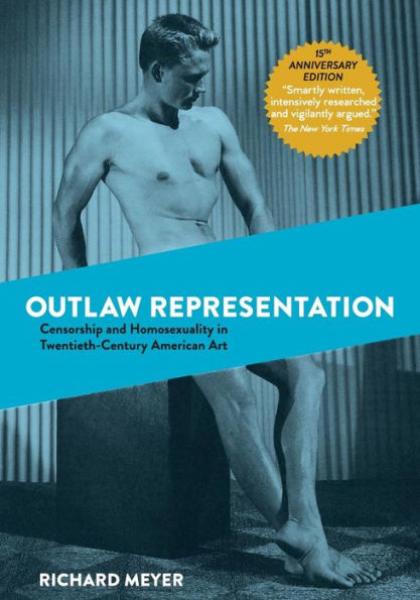Description
"I know it when I see it..." These words, famously spoken in 1964 by United States Supreme Court Justice Potter Stewart, became the rallying cry of the anti-obscenity lobby as their enraged howls became the soundtrack to a tumultuous mixture of modern art, homosexuality, and public funding.
Author Richard Meyer charts the history of this American culture war through detailed analysis of the work of artists who fought on the front lines, often finding themselves personally vilified...and their artwork suppressed, denounced, and censored.
Meyer tells the heroic story of the artists who, rather than acquiesce to their critics, doubled down in their response and created an "outlaw representation" of homosexuality. Liberated by their new outlaw status, the homosexual art community was suddenly free to create some of the most socially important work of their generation.
Outlaw Representation is filled with brilliant artwork from some of the most celebrated artists of the 20th Century, including...
- Andy Warhol
- Robert Mapplethorpe
- Paul Cadmus
- Gran Fury
- David Wojnarowicz
- Holly Hughes
- ... and many more
"Richard Meyer's Outlaw Representation tells the amazing, often outrageous, story of the battle over censorship and homosexuality in the modern art world. Featuring detailed analysis, biographical information, and artwork from such famous figure as Andy Warhol and Robert Mapplethorpe, this book will educate and enrage lovers of artistic freedom."--Provided by publisher.
"Smartly written, intensively researched and vigilantly argued . . . Whether analyzing a painting or the words of a political speech, Meyer comes across as a cool but engaged observer. Most important, he's a good storyteller and he has fascinating stories to tell." -Holland Cotter, The New York Times
"This genuinely groundbreaking book charts the unexpectedly productive as well as restrictive effects of queers' multiple encounters with censorship over the course of the last century. Beautifully written and illustrated, Meyer's study combines significant historical research and reflection with richly insightful interpretations of queer art to illuminate the history of twentieth-century American art and culture as a whole as well as the distinctive and little-known history of gay artists." -George Chauncey, author of Gay New York: Gender, Urban Culture, and the Making of the Gay Made World, 1890-1940
"This terrifically smart and intellectually savvy book should be required bedside reading for every public official boorish enough to wage war on the resourceful and imaginative world of contemporary American art." -Diana Fuss, author of Inside/Out: Lesbian Theories, Gay Theories
"Richard Meyer crafts a brilliant and persuasive argument about the interdependence of representations of homosexuality and acts of censorship...To my mind, the book sets a new standard for contemporary art-historical scholarship." -Cecile Whiting, author of A Taste for Pop: Pop Art Gender, and Consumer Culture
"Meyer deftly combines a close reading of individual works and intelligent social and political synthesis." -Linda Nochlin, "Best of 2002: Books," Artforum
Product Details
- Echo Point Books & Me Brand
- Apr 4, 2019 Pub Date:
- 1635618290 ISBN-10:
- 9781635618297 ISBN-13:
- 392 Pages
- 10 in * 7 in * 1.07 in Dimensions:
- 2 lb Weight:




